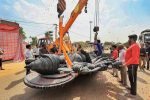
Carbon capture and storage: where should the world store CO₂? It’s a moral dilemma
PTI, Dec 7, 2021, 2:39 PM IST

Representative Image
Cork (Ireland): The recent Glasgow climate pact committed 197 countries to “phas[ing] down unabated coal”. Unabated coal refers to when power stations or factories burn coal without capturing and storing the carbon dioxide (CO₂) generated.
Because the world has made such little progress in eliminating coal, oil and fossil gas, climate modellers foresee some use of carbon capture and storage as necessary to reach zero emissions in enough time to avert catastrophic warming. The technology to capture carbon is in development, but one burning question remains: where on Earth should we store all that carbon? Different methods of carbon capture will take place at different sites.
Some involve absorbing emissions immediately after burning fossil fuels in chimneys and smokestacks where the CO₂ is highly concentrated. Other methods capture carbon directly from the air, either by using chemical reactions that bind the carbon using lots of energy or by growing carbon-hungry plants that can be burned for energy and the resulting emissions subsequently captured.
In new research, myself and environmental engineer Joe Lane at Princeton University in the US argued that, regardless of the method, leaving decisions about where to store carbon to commercial entities would mean avoiding an important moral dilemma.
Funding for carbon capture and storage is insufficient. At the current rate of deployment, 700 million tonnes of CO₂ storage capacity will be added by 2050 – 10% of what is required.
Countries would have to massively ramp up investment to be compliant with the Paris agreement’s target of limiting global warming to 1.5°C. Some of this money would be public funding, and people would reasonably expect it to fund projects which are morally sound.
On the one hand, it might be deemed important to develop storage sites with the best prospects for storing lots of greenhouse gas for the longest duration. This argument maintains that the most important consideration for deploying carbon capture and storage is making the largest possible contribution to arresting climate change.
To give carbon storage sites the greatest chance of success, it makes sense to develop them in places where the geology has been thoroughly explored and where there is lots of relevant expertise. This would imply pumping carbon into underground storage sites in northern Europe, the Middle East and the US, where companies have spent centuries looking for and extracting fossil fuels.
Storing carbon is roughly the reverse of extracting it from the ground, and there is an opportunity for workers in the oil and gas industry to lend their skills and expertise to this endeavour.
On the other hand, it might be important to develop storage sites in economies where the current and future demand for carbon capture and storage is greatest. These competing aims pull in different directions. The regions with the best prospects are not often those with the greatest expected need.
Developing storage sites in economies where the expected demand for carbon capture is highest overwhelmingly favours developing regions of Asia. In India and China, for instance, coal power stations and cement plants are expensive to decommission and will need lots of carbon capture and storage capacity to decarbonise.
If developing regions are expected to decarbonise without sufficient support to roll out carbon capture and storage, it could mean they have to throttle development to reduce emissions.
There are no easy answers in this debate. Increasing carbon capture and storage capacity as quickly as possible could benefit future generations by reducing the severity of climate change. So, you could argue that developing the most promising sites in Europe is the best way forward. But directing investment for storage facilities from wealthy countries to developing regions could help address the debt the former owes the latter for causing the brunt of the climate crisis.
World leaders should recognise this moral dilemma and consider the choices with urgency. The need to remove and safely store carbon becomes more severe by the day. Given the time and costs involved in developing storage sites, and the real possibility that the storage sites may not be sufficient for the carbon countries emit, this is a question that cannot be delayed. (The Conversation)
(By Kian Mintz-Woo, Lecturer in Philosophy, Environmental Research Institute, University College Cork)
Udayavani is now on Telegram. Click here to join our channel and stay updated with the latest news.
Top News
Related Articles More

Study predicts accelerated warming of Indian ocean with catastrophic consequences

Space enthusiasts ask ISRO chief if agency can find water on moon

Deep-tech drives growing patenting patterns in India; highest filings in Tamil Nadu: Study

Don’t blame Dubai’s freak rain on cloud seeding

ISRO Gears Up to Test Critical Parachute Safety of Gaganyaan
MUST WATCH
Latest Additions

Some countries, institutions want weak govt to make easy profits: PM Modi

People can talk anything they want to, I know my game better: Virat Kohli on his strike rate

Sexual harassment, stalking case registered against ex-minister H D Revanna and his son Prajwal

Reservation row: Congress campaign ‘biggest lie’ of the decade, says Kishan Reddy

BJP trying religious polarisation in Nagaon: Congress candidate Pradyut Bordoloi

























